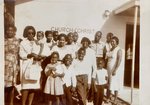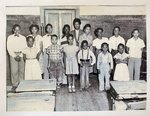


“Juneteenth” is an opportunity for all to reflect upon a moment in time of our great country! As we discuss the significance of this holiday, we are reminded of a dark period in U.S. history, worthy of forgetting.
The philosopher George Santayana is quoted as saying, “Those who cannot remember the past are condemned to repeat it.” Simply put, we must remember and learn from our history, no matter how painful it is.
The history of Juneteenth dates to June 19, 1865, when those enslaved persons in Texas learned of their freedom. Ironically, the news of their freedom occurred approximately two years after the Emancipation Proclamation, Jan. 1, 1863), which in effect, freed all enslaved persons in the United States.
As I think about the significance of this holiday, we must apply our sense of time to the institution of slavery. In the context of years, African Americans were enslaved in the United States for hundreds of years. So why does two more years matter?
In our present state of things, two years seems like an eternity in the best of environments and conditions, but how about for those enslaved? I believe that the point of information being delayed at best, and/or intentionally withheld at worst, drives home the cruel nature of the act. Sir Francis Bacon invoked the concept of knowledge being used as power; the example of Juneteenth easily underscores this point.
Juneteenth should serve as a constant reminder that those who possess impactful knowledge have an obligation to share it in a way that ensures clarity and compliance. As well, one must seek knowledge for themselves.
Unlike those enslaved in 1865 Texas, Americans now have the ability to seek out knowledge, via a host of mediums, to inform themselves on anything under the sun. We must continue to obtain, verify and share information that serves to uplift our fellow citizens, regardless of any discriminating factors.
Juneteenth underscores our collective need to ensure that information is communicated in a way that provides the best information to those who may be disenfranchised, downtrodden and possibly, unenlightened.
Finally, the importance of this holiday to our community cannot be denied. It provides an impactful opportunity to reflect upon our township’s history.
From early on in West Plains’ formation, formerly enslaved citizens and their immediate descendants lived and worked in various capacities: They studied at the Lincoln School, worshipped at the Washington Street Church of Christ and were laid to rest at the Sadie Brown Cemetery, all of which still survive today. There is an opportunity to cultivate this history in a way that continues to 1) uplift all our citizens, and 2) educate future generations.
Please use the backdrop of Juneteenth to celebrate its history, educate yourself and others and most importantly, for personal reflection. I end with a quote by author Martin Ugochukwu Ugwu: “Knowledge is power. Sharing knowledge is the key to unlocking that power.”